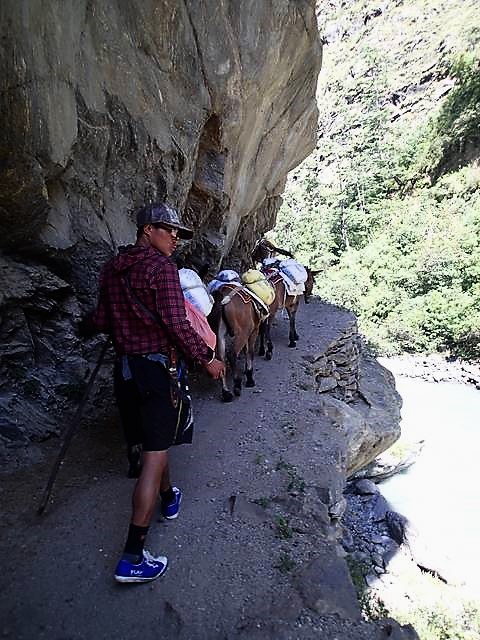Oct 11 Philim to Ghap. Manaslu trek, Nepal.
We had to leave early as this was to be a long, hard day of 10 hours. We all
had egg and noodle soup and left at 7:30am. The day again featured deep river
gorges. There were more caravans of pack animals, as this was the only way to
supply villages further on in both the Manaslu and Tsum valley routes.


A lot of work goes into making inscriptions on rocks around the stupas. I have
no idea what they say, presumably some sort of philosophical Bhuddist
teaching.



For lunch I had a vegetable curry and chapati. For dinner I had an excellent
dahl blat with fresh green beans and potatoes. For dessert a delicious pumpkin
pie.

The kitchen was of a design common to all kitchens on this trail. It is has a
central oven that is an open ended steel box with a chimney, on top is a
cooking plate. Simple, but effective to to cater for the masses, and provide
much needed warmth on the chill alpine days.

Buddhist religion more prevalent with many chorten and prayer flags. Chorten
or stupa are stone structures of differing sizes or shapes. During
construction they contain relics, offerings and prayers. There are also mani
stones which are tablets with prayer inscriptions. We also see stone gateways
to mark entrances - nothing unusual in our western fenced society except there
are no fences here.

I had a kid chase me down a hill demanding a pen. It gets a bit tiresome at
times with the demands to supply pens. Something I think
other tourists are to blame and have built an expectation. I
reckon it is a better move to donate to the community school, or pure water /
sanitation scheme.
Minor irritations, there is lots to look at. From flowers to flowing
rivers or religious artifacts it doesn't stop.

I lost a basket off one of my trekking poles, I must remember to either stick them on, carry spares or don't have them at all. These are light Gossamer gear poles weighing 120g each, they are holding up well and are great being so light. I only brought them for my tent, but they have proven useful especially on keeping balance on descents.

Water is available in many places, people wash and collect water for drinks
there.Supposedly it is of good quality, but I always filtered it to be
sure.

The mountains are exposing themselves more and look quite majestic, dwarfing
us within the narrow walls of the valley.

Upward we go, there were a few hundred metres elevation gain today.

A short cold dip in a cascade was very refreshing during the day to relieve
my muscles and fatigue.

We stayed in a very pleasant tea house. A new building, food was excellent,
with another even better pumpkin pie than yesterday for dessert.

When eating with us Rajesh would use the cutlery, however the Nepalese
generally would use their fingers. It doesn't bother me either way, but from a
hygiene point of view and the convenience I prefer cutlery. The lights were
quite dim as solar power is used to provide electricity.

I soon discovered the porters and our guide love playing cards. My deck proved
to be very handy, and I gifted them to the porters at the end of the
walk.
Almost every night we play cards together, today we are playing whilst waiting
for lunch. Rajesh taught me Dhumbal, a popular Nepalese game that has
similarity to Yaniv played
in Israel. I taught him and the porters my favourite games of 500, switch and
hearts.
I like the game of dhumbal and hope to carry on playing it when I get
home.
- The objective is to diminish the overall sum of the point value of the cards in your hand to 5 or below, then call and hope that you have the lowest value at that time.
-
The game starts with 5 cards, discard one or more cards in a straight in
the same suit or a set of 2 or more of the same value.
- Take a single replenishment card from the discard to the left (game is anti-clockwise) or from the undealt pile. eg. you have 2 lots of 7, discard them and pick up one from the deck or from the last discard of the person on your left.
- Ace is the lowest card at one point.
- If you call dhumbal instead of discarding and someone else has the same or lower total than you then you lose and you add 25 to the total of your cards. eg if you call dhumbal on a total of 4 and I have a total of 3, then you score 25 + 4 = 29.
-
The first person to score over 100 loses. If you score 100 then you have a
reprieve and go back to 50.

Each day on this trek has been special. We started with the warm agricultural
valley at 520 metres, now we are ascending at altitudes over 3000 metres and
the mountains are looming high in the sky. As the saying goes; "it's the
journey that counts".

Contents
Navigate- Prev: Tatopani to Philim.
- Next: Ghap to Lho
Comments
Post a Comment